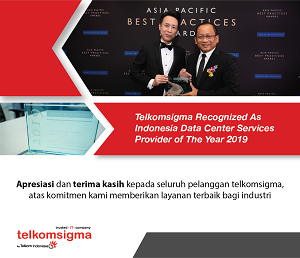Indonesia Have Plenty Regulation Targeting on OTT
06:47:31 | 18 Feb 2016

Ilustrasi (dok)
JAKARTA (IndoTelko) - Indonesian Telematics Society (Mastel) considers the government have the ability to limit and make foreign OTT (Over The Top) players to subject to it's numerous regulation.
"Actually, there's no need to issue a new Ministerial Regulation (Permen) for OTT, because if we examine all foreign OTT legal acts in Indonesian market does not fully comply the country's regulation according to the applicable legislation," said Mastel Chairman Kristiono to IndoTelko, yesterday.
OTT is a player that is identical to data network operator filler. OTT players are considered as a latent danger for the operator because it does not pull out a big investment, but make profits above the operator's network.
Along with its development, OTT is classified based on applications, content or services. Businesses groups that is included in OTT such as Facebook, Twitter or Google.
OTT was booming in a country that has a wide coverage of broadband penetration with adequate speed access at least 10 Mbps. According to him, should have been the product of foreign OTT blocked since the beginning and were asked to adjust in advance with the provisions of existing legislation.
"Because if they are not blocked first then they will be reluctant to comply, there should be a forcibly power from the government to the OTT. Clearly, that the products are detrimental to the Indonesian interests, either from loss of potential tax that can be cited of the service they provide in Indonesian jurisdiction and has weakened the national telematics industry," he said.
He added that the government's omission attitude until now makes it more difficult to enforce the rules for foreign OTT services that had already been enjoyed by the wider community.
"If the government to issue a Ministerial Regulation, perhaps intended to further clarify and emphasize on the regulation avoiding any doubts in the act," he described.
Previously, foreign OTT matter was raised again in the national telecommunications post sector, Telkom have blocked Netflix after considered not to meet the Indonesian regulations and seem arrogant before the state-owned operator.
Not Afraid
Director of Consumer Telkom Dian Rachmawan said that the OTT players are not taken as a threat as he has prepared a number of strategies to deal with it. "We do not see OTT as a threat, but a new opportunity that should be worked on. It is a big mistake if anyone considers Telkom afraid of OTT. We only want to be fair in running a business," he said. He admitted that the presence of OTT will continue to erode potential Telecommunications operator revenue. "However, Telco should rely on the advantages of infrastructure, human and financial resources that they have to take the same opportunities in the OTT business," he said. According to him, the OTT runs its service which most is free by riding the bandwidth that belongs to Telco, but addressed differently by the network provider. "Some have viewed as a threat (pessimistic), some consider it as an opportunity (optimistic) and mostly resigned (realist) witnessing the OTT invasion. Telkom is optimistic and will fight back. We already have a strategy to deal with this phenomenon long before." he said. Dian said that Telkom's strategy facing the four OTT battle areas is by maintaining the existing voice and offer better quality (crystal clear voice, etc.) to attract users. Social media did manage retreat. In Video / Internet TV content platform offers, and invites bandwidth thirsty content become one of the distributed content via Telkom owned internet TV platform. As for the Cloud / IOT / M2M is offering cloud computing platform to optimize infrastructure owned by Telkom. For example, the use of data center or a solution of TelkomSigma. More Dian explained, one of which must be seen in the relationship between the operator with OTT is a matter of sovereignty both in the management of the network or comply with regulations in a country. "We blocked Netflix because it seemed like they did not understand Indonesia thoroughly. Arrogance and disdain becomes a boomerang for the survival of their business in Indonesia. It is very naive that they are partnering with local Telco when entering another country, but they don’t even bother to recognize us in Indonesia," said Dian. Dian added that global content/video players OTT especially for paid video services, in dire need of business cooperation with local Telco especially in billing mechanism to the customer. "You see, the population of credit card owners and modes of use of credit cards for online purchases in Indonesia is still relatively very small. Besides, OTT players require the content placement cooperation on the Content Delivery Network (CDN) platform belong to the local Telco for quality service and content censorship setting. Some content/video OTT players' have carried out final negotiations with us, they are even more marketable and accepted by the market rather than Netflix. Through the Tripleplay modes, video OTT can be enjoyed with excellent quality, reasonable price and without consuming customers' internet bandwidth," he said. He expected, all parties can see more clearly the OTT phenomenon to have a unified view that the state and the nation must be sovereign over the utilization of the Internet for the benefit of the nation that covers all aspects of Ideology, Political, Economic, Social, Cultural, Defense and Security. "Please note that most of the OTT players are headquartered in the US, we certainly can not replicate the extreme measure like China that do not allow Facebook, Google, Amazon, PayPal and replace with QQ, Baidu, Alibaba, Alipay, but at least there is a middle way approach that also empowers local OTT players to the sovereignty of the Republic of Indonesia," he concluded. Incentive
Indonesian Telecommunications Regulatory Agency (BRTI) Commissioner member Muhammad Imam Nashiruddin admitted that he had two options in the regulation was to target foreign OTT. "Basically we give incentives to OTT who want to cooperate with operators and place the server in the country. However, there is disincentive for operators who do not want to cooperate or OTT who don’t want to place server in Indonesia," he said. According to Imam, foreign or local OTT must cooperate with the operator's to create easier content management. "At least the operator can manage the bandwidth. Then if there are orders from the regulators to censor the content then it can be done faster," he said. For those ignorant OTT who would not respect the rules then will charged to sanction from blocked or charged by operator. "The discussions about sanctions are still ongoing, either to block or other penalty forms. But the incentives and disincentives concept should be imposed," he concluded. Meanwhile, Director General of Post and Information Operator (PPI) Kalamullah Ramli admitted that a more comprehensive rule is underway to regulate the OTT business in Indonesia. "In managing OTT in Indonesia, we are preparing a regulation on OTT which scheduled to be issued in March 2016 which concerning on issues including the permanent establishment, Equal level playing field with local players, as well as content. There are some issues that need also the direction from the Minister," he concluded. (es)
Baca juga :
•
•
•
Director of Consumer Telkom Dian Rachmawan said that the OTT players are not taken as a threat as he has prepared a number of strategies to deal with it. "We do not see OTT as a threat, but a new opportunity that should be worked on. It is a big mistake if anyone considers Telkom afraid of OTT. We only want to be fair in running a business," he said. He admitted that the presence of OTT will continue to erode potential Telecommunications operator revenue. "However, Telco should rely on the advantages of infrastructure, human and financial resources that they have to take the same opportunities in the OTT business," he said. According to him, the OTT runs its service which most is free by riding the bandwidth that belongs to Telco, but addressed differently by the network provider. "Some have viewed as a threat (pessimistic), some consider it as an opportunity (optimistic) and mostly resigned (realist) witnessing the OTT invasion. Telkom is optimistic and will fight back. We already have a strategy to deal with this phenomenon long before." he said. Dian said that Telkom's strategy facing the four OTT battle areas is by maintaining the existing voice and offer better quality (crystal clear voice, etc.) to attract users. Social media did manage retreat. In Video / Internet TV content platform offers, and invites bandwidth thirsty content become one of the distributed content via Telkom owned internet TV platform. As for the Cloud / IOT / M2M is offering cloud computing platform to optimize infrastructure owned by Telkom. For example, the use of data center or a solution of TelkomSigma. More Dian explained, one of which must be seen in the relationship between the operator with OTT is a matter of sovereignty both in the management of the network or comply with regulations in a country. "We blocked Netflix because it seemed like they did not understand Indonesia thoroughly. Arrogance and disdain becomes a boomerang for the survival of their business in Indonesia. It is very naive that they are partnering with local Telco when entering another country, but they don’t even bother to recognize us in Indonesia," said Dian. Dian added that global content/video players OTT especially for paid video services, in dire need of business cooperation with local Telco especially in billing mechanism to the customer. "You see, the population of credit card owners and modes of use of credit cards for online purchases in Indonesia is still relatively very small. Besides, OTT players require the content placement cooperation on the Content Delivery Network (CDN) platform belong to the local Telco for quality service and content censorship setting. Some content/video OTT players' have carried out final negotiations with us, they are even more marketable and accepted by the market rather than Netflix. Through the Tripleplay modes, video OTT can be enjoyed with excellent quality, reasonable price and without consuming customers' internet bandwidth," he said. He expected, all parties can see more clearly the OTT phenomenon to have a unified view that the state and the nation must be sovereign over the utilization of the Internet for the benefit of the nation that covers all aspects of Ideology, Political, Economic, Social, Cultural, Defense and Security. "Please note that most of the OTT players are headquartered in the US, we certainly can not replicate the extreme measure like China that do not allow Facebook, Google, Amazon, PayPal and replace with QQ, Baidu, Alibaba, Alipay, but at least there is a middle way approach that also empowers local OTT players to the sovereignty of the Republic of Indonesia," he concluded. Incentive
Indonesian Telecommunications Regulatory Agency (BRTI) Commissioner member Muhammad Imam Nashiruddin admitted that he had two options in the regulation was to target foreign OTT. "Basically we give incentives to OTT who want to cooperate with operators and place the server in the country. However, there is disincentive for operators who do not want to cooperate or OTT who don’t want to place server in Indonesia," he said. According to Imam, foreign or local OTT must cooperate with the operator's to create easier content management. "At least the operator can manage the bandwidth. Then if there are orders from the regulators to censor the content then it can be done faster," he said. For those ignorant OTT who would not respect the rules then will charged to sanction from blocked or charged by operator. "The discussions about sanctions are still ongoing, either to block or other penalty forms. But the incentives and disincentives concept should be imposed," he concluded. Meanwhile, Director General of Post and Information Operator (PPI) Kalamullah Ramli admitted that a more comprehensive rule is underway to regulate the OTT business in Indonesia. "In managing OTT in Indonesia, we are preparing a regulation on OTT which scheduled to be issued in March 2016 which concerning on issues including the permanent establishment, Equal level playing field with local players, as well as content. There are some issues that need also the direction from the Minister," he concluded. (es)
Artikel Terkait
-
 English Ver. - 04:00:00 | 19 May 2024The real estate sector is observably shifting toward sustainability
English Ver. - 04:00:00 | 19 May 2024The real estate sector is observably shifting toward sustainability -
 English Ver. - 05:21:00 | 03 May 2024Primary drivers for IT infrastructure investments in the next year include ransomware prevention
English Ver. - 05:21:00 | 03 May 2024Primary drivers for IT infrastructure investments in the next year include ransomware prevention
Rekomendasi
Berita Pilihan
More Stories
PR Newswire




























































